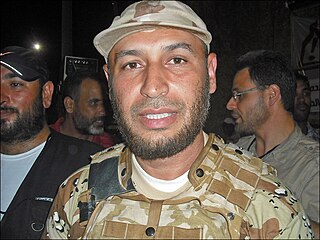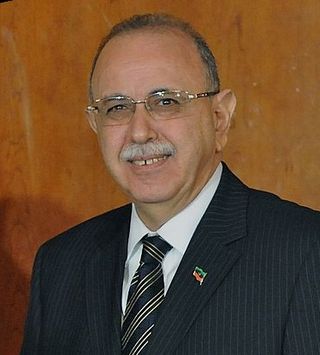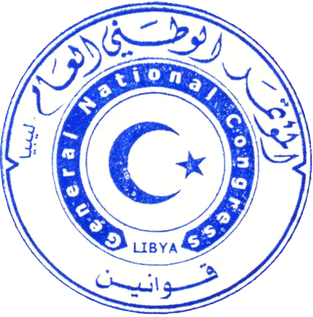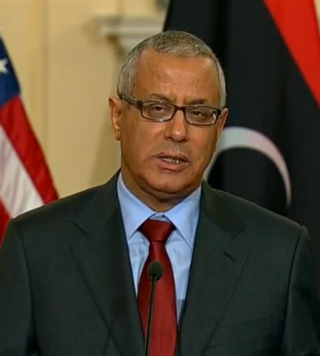Related Research Articles

Libya's history involves its rich mix of ethnic groups,including the indigenous Berbers/Amazigh people. Amazigh have been present throughout the entire history of the country. For most of its history,Libya has been subjected to varying degrees of foreign control,from Europe,Asia,and Africa.

Libya,officially the State of Libya,is a country in the Maghreb region of North Africa. Libya borders the Mediterranean Sea to the north,Egypt to the east,Sudan to the southeast,Chad to the south,Niger to the southwest,Algeria to the west,and Tunisia to the northwest,as well as maritime borders with Greece,Italy and Malta to the north. Libya comprises three historical regions:Tripolitania,Fezzan,and Cyrenaica. With an area of almost 1.8 million km2 (700,000 sq mi),it is the fourth-largest country in Africa and the Arab world,and the 16th-largest in the world. Libya claims 32,000 square kilometers of southeastern Algeria,south of the Libyan town of Ghat. The country's official religion is Islam,with 96.6% of the Libyan population being Sunni Muslims. The official language of Libya is Arabic,with vernacular Libyan Arabic being spoken most widely. The majority of Libya's population is Arab. The largest city and capital,Tripoli,is located in northwestern Libya and contains over a million of Libya's seven million people.

The politics of Libya has been in an uncertain state since the collapse of the Libyan Arab Jamahiriya in 2011 and a recent civil war and various jihadists and tribal elements controlling parts of the country. On 10 March 2021,the interim Government of National Unity (GNU),unifying the Second Al-Thani Cabinet and the Government of National Accord was formed,only to face new opposition in Government of National Stability,until Libyan Political Dialogue Forum assured the ongoing ceasefire.

Muammar Muhammad Abu Minyar al-Gaddafi was a Libyan revolutionary,politician and political theorist who ruled Libya from 1969 until his assassination by rebel forces in 2011. He first served as Revolutionary Chairman of the Libyan Arab Republic from 1969 to 1977 and then as the Brotherly Leader of the Great Socialist People's Libyan Arab Jamahiriya from 1977 to 2011. Initially ideologically committed to Arab nationalism and Arab socialism,Gaddafi later ruled according to his own Third International Theory.

Saif al-Islam Muammar al-Gaddafi is a Libyan political figure. He is the second son of the late Libyan leader Muammar Gaddafi and his second wife Safia Farkash. He was a part of his father's inner circle,performing public relations and diplomatic roles on his behalf. He publicly turned down his father's offer of the country's second highest post and held no official government position. According to United States Department of State officials in Tripoli,during his father's reign,he was the second most widely recognized person in Libya,being at times the de facto prime minister,and was mentioned as a possible successor,though he rejected this. An arrest warrant was issued for him on 27 June 2011 by the International Criminal Court (ICC) for charges of crimes against humanity against the Libyan people,for killing and persecuting civilians,under Articles 7(1)(a) and 7(1)(h) of the Rome statute. He denied the charges.

The Third International Theory,also known as the Third Universal Theory and Gaddafism,was the style of government proposed by Muammar Gaddafi on 15 April 1973 in his Zuwara speech,on which his government,the Great Socialist People's Libyan Arab Jamahiriya,was officially based. It combined elements of Arab nationalism,Nasserism,Anti-imperialism,Islamic socialism,left-wing populism,African nationalism,Pan-Arabism,and it was partly influenced by the principles of direct democracy. The theory also contained elements of Islamic fundamentalism,for Gaddafi argued that Muslims needed to return to God and the Qur'an and rejected formal interpretation of the Qur'an as blasphemy. However,Gaddafi's regime has been described as Islamist,rather than fundamentalist,for he opposed Salafism,and many Islamic fundamentalists were imprisoned during his rule.

Muammar Gaddafi became the de facto leader of Libya on 1 September 1969 after leading a group of young Libyan Army officers against King Idris I in a bloodless coup d'état. After the king had fled the country,the Revolutionary Command Council (RCC) headed by Gaddafi abolished the monarchy and the old constitution and established the Libyan Arab Republic,with the motto "freedom,socialism and unity". The name of Libya was changed several times during Gaddafi's tenure as leader. From 1969 to 1977,the name was the Libyan Arab Republic. In 1977,the name was changed to Socialist People's Libyan Arab Jamahiriya. Jamahiriya was a term coined by Gaddafi,usually translated as "state of the masses". The country was renamed again in 1986 as the Great Socialist People's Libyan Arab Jamahiriya,after the United States bombing that year.

The Libyan civil war or the 2011 Libyan revolution,also known as the First Libyan Civil War was an armed conflict in 2011 in the North African country of Libya that was fought between forces loyal to Colonel Muammar Gaddafi and rebel groups that were seeking to oust his government. The war was preceded by protests in Zawiya on 8 August 2009 and finally ignited by protests in Benghazi beginning on Tuesday,15 February 2011,which led to clashes with security forces who fired on the crowd. The protests escalated into a rebellion that spread across the country,with the forces opposing Gaddafi establishing an interim governing body,the National Transitional Council.

The National Transitional Council (NTC) was a transitional government established in the 2011 Libyan civil war. The rebel forces overthrew the Libyan Arab Jamahiriya of Muammar Gaddafi. The NTC governed Libya for a period of ten months after the end of the war,holding elections to a General National Congress on 7 July 2012,and handing power to the newly elected assembly on 8 August.

Mahdi al-Harati is an Irish-Libyan politician and former co-commander of the Tripoli Brigade during the Libyan Civil War. He was also the commander of Liwaa Al-Umma,a militant group fighting against the Syrian government in the Syrian civil war.

The Brotherly Leader and Guide of the Revolution of the Great Socialist People's Libyan Arab Jamahiriya was a title held by former Libyan leader Muammar Gaddafi,who claimed to be merely a symbolic figurehead of the country's official governance structure. However,critics have long described him as a demagogue,referring to his position as the de facto former political office,despite the Libyan state's denial of him holding any power.

Parliamentary elections were held in Libya on 25 June 2014 for the House of Representatives. Whilst all candidates ran as independents,the elections saw nationalist and liberal factions win the majority of seats,with Islamist groups being reduced to only around 30 seats. Election turnout was very low at 18%.

Mohammed Yousef el-Magariaf or,as he writes on his official website,Dr. Mohamed Yusuf Al Magariaf,is a Libyan politician who served as the President of the General National Congress from its first meeting in August 2012 until his resignation in May 2013. In this role he was effectively Libya's de facto head of state,until his resignation in May 2013.

Abdurrahim Abdulhafiz El-Keib,PhD,was a Libyan politician,professor of electrical engineering,and entrepreneur who served as interim Prime Minister of Libya from 24 November 2011 to 14 November 2012. He was appointed to the position by the country's National Transitional Council on the understanding that he would be replaced when the General National Congress was elected and took power. Power was handed to the Congress on 8 August 2012,and the assembly appointed El-Keib's successor Ali Zeidan in October 2012.

The General National Congress or General National Council was the legislative authority of Libya for two years following the end of the First Libyan Civil War. It was elected by popular vote on 7 July 2012,and took power from the National Transitional Council on 8 August.

Ali Zeidan is a former Prime Minister of Libya. He was appointed by the General National Congress on 14 October 2012,and took office on 14 November after Congress approved his cabinet nominees. Prior to the Libyan Civil War,Zeidan was a Geneva-based human rights lawyer. According to the BBC,he is considered by some local observers as a strong-minded liberal. He was ousted by the parliament committee and fled from Libya on 14 March 2014. However,he told a press conference in Rabat,Morocco,that the ousting was invalid.

The Libyan civil war (2014–2020),also more commonly known as the Second Libyan Civil War,was a multilateral civil war which was fought in Libya between a number of armed groups,but mainly the House of Representatives (HoR) and the Government of National Accord,for six years from 2014 to 2020.

The Libyan House of Representatives is the legislature of Libya resulting from the 2014 Libyan parliamentary election,which had an 18% turnout. On 4 August 2014,in the course of the progressing August 2014 Islamist coup in the capital Tripoli in the context of the Libyan Civil War,the House of Representatives relocated itself to Tobruk in the far east of Libya. Several HoR sessions were held in Tripoli in May 2019 while Tripoli was under armed attack,electing an Interim Speaker for 45 days. Between 2014 and 2021,the House of Representatives supported the Tobruk-based government led by Abdullah al-Thani before supporting the incumbent Government of National Unity led by Abdul Hamid Dbeibeh. In September 2021,the House of Representatives passed a no-confidence motion against the interim GNU government and later appointed a rival Government of National Stability (GNS).

The Libyan Crisis is the current humanitarian crisis and political-military instability occurring in Libya,beginning with the Arab Spring protests of 2011,which led to two civil wars,foreign military intervention,and the ousting and death of Muammar Gaddafi. The first civil war's aftermath and proliferation of armed groups led to violence and instability across the country,which erupted into renewed civil war in 2014. The second war lasted until October 23,2020,when all parties agreed to a permanent ceasefire and negotiations.

Fathi Ali Abdul Salam Bashagha,known simply as "Fathi Bashagha" or occasionally Fathi Ali Pasha,is a Libyan politician and the former interim prime minister of Government of National Stability. He served as Minister of Interior from 2018 to 2021.
References
- ↑ "Libya's transitional rulers hand over power". Ventura County Star. Archived from the original on 5 February 2013. Retrieved 25 August 2012.
- ↑ "Libya's NTC hands power to newly elected assembly". BBC News. 9 August 2012. Retrieved 9 August 2012.



